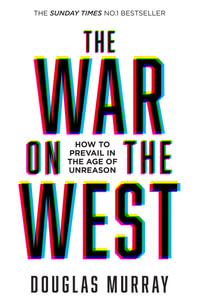-A. James Gregor advances a controversial thesis. The critical reader will recognize this as an impressive work of schoalrship. It is based on original source materials, placed in historical perspective, and subjected to thoughtful examination. Gregor has done what every historian should do: think, and challenge his readers to think for themselves. The result bears witness to intellectual integrity.-
--Richard A Cooper, The Pragmatist
-Gregor's brief account of the life and political philosophy of one of the crucial figures in the history of Italian fascism analyzes Gentile's philosophy of actualism and its impact on Italian intellectual life during the fascist era (1922-43). . . . Recommended for upper-division undergraduates and above.-
--Choice
"A. James Gregor advances a controversial thesis. The critical reader will recognize this as an impressive work of schoalrship. It is based on original source materials, placed in historical perspective, and subjected to thoughtful examination. Gregor has done what every historian should do: think, and challenge his readers to think for themselves. The result bears witness to intellectual integrity."
--Richard A Cooper, The Pragmatist
"Gregor's brief account of the life and political philosophy of one of the crucial figures in the history of Italian fascism analyzes Gentile's philosophy of actualism and its impact on Italian intellectual life during the fascist era (1922-43). . . . Recommended for upper-division undergraduates and above."
--Choice
"A. James Gregor advances a controversial thesis. The critical reader will recognize this as an impressive work of schoalrship. It is based on original source materials, placed in historical perspective, and subjected to thoughtful examination. Gregor has done what every historian should do: think, and challenge his readers to think for themselves. The result bears witness to intellectual integrity."
--Richard A Cooper, The Pragmatist
"Gregor's brief account of the life and political philosophy of one of the crucial figures in the history of Italian fascism analyzes Gentile's philosophy of actualism and its impact on Italian intellectual life during the fascist era (1922-43). . . . Recommended for upper-division undergraduates and above."
--Choice
"Gregor's brief account of the life and political philosophy of one of the crucial figures in the history of Italian fascism analyzes Gentile's philosophy of actualism and its impact on Italian intellectual life during the fascist era (1922-43)....Recommended for upper-division undergraduates and above."
- "Choice"
"Gregor's brief account of the life and political philosophy of one of the crucial figures in the history of Italian fascism analyzes Gentile's philosophy of actualism and its impact on Italian intellectual life during the fascist era (1922-43)....Recommended for upper-division undergraduates and above."
- "Choice"
























